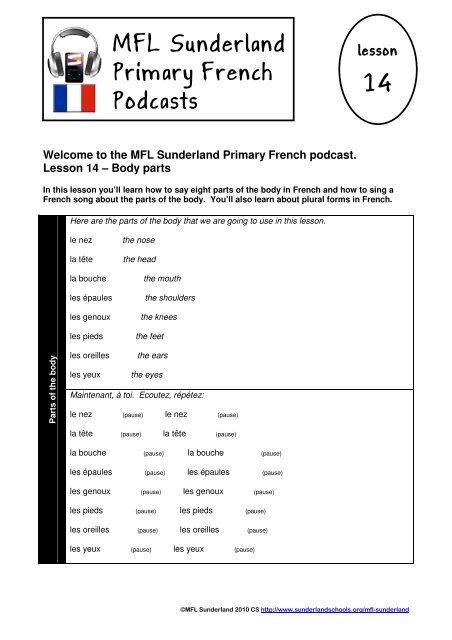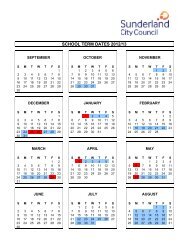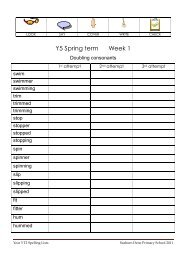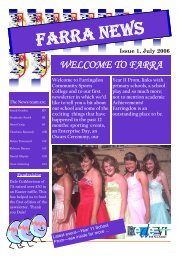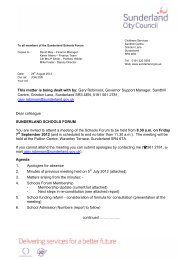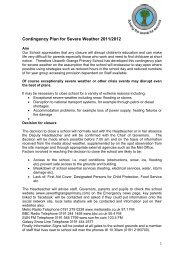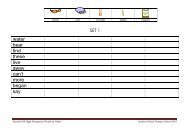MFL Sunderland Primary French Podcasts 14
MFL Sunderland Primary French Podcasts 14
MFL Sunderland Primary French Podcasts 14
You also want an ePaper? Increase the reach of your titles
YUMPU automatically turns print PDFs into web optimized ePapers that Google loves.
Welcome to the <strong>MFL</strong> <strong>Sunderland</strong> <strong>Primary</strong> <strong>French</strong> podcast.<br />
Lesson <strong>14</strong> – Body parts<br />
In this lesson you’ll learn how to say eight parts of the body in <strong>French</strong> and how to sing a<br />
<strong>French</strong> song about the parts of the body. You’ll also learn about plural forms in <strong>French</strong>.<br />
Parts of the body<br />
<strong>MFL</strong> <strong>Sunderland</strong><br />
<strong>Primary</strong> <strong>French</strong><br />
<strong>Podcasts</strong><br />
Here are the parts of the body that we are going to use in this lesson.<br />
le nez the nose<br />
la tête the head<br />
la bouche the mouth<br />
les épaules the shoulders<br />
les genoux the knees<br />
les pieds the feet<br />
les oreilles the ears<br />
les yeux the eyes<br />
Maintenant, à toi. Ecoutez, répétez:<br />
le nez (pause) le nez (pause)<br />
la tête (pause) la tête (pause)<br />
la bouche (pause) la bouche (pause)<br />
les épaules (pause) les épaules (pause)<br />
les genoux (pause) les genoux (pause)<br />
les pieds (pause) les pieds (pause)<br />
les oreilles (pause) les oreilles (pause)<br />
les yeux (pause) les yeux (pause)<br />
lesson<br />
<strong>14</strong><br />
©<strong>MFL</strong> <strong>Sunderland</strong> 2010 CS http://www.sunderlandschools.org/mfl-sunderland
Plurals<br />
Tête, épaules, genoux, pieds<br />
In Lesson 7A we found out that “le” and “la” both mean “the”, and that the former is<br />
masculine and the latter feminine. In Lesson 7C we found out that “l’” also means “the”,<br />
and that it is used before masculine or feminine nouns that begin with a vowel or an h.<br />
If you are following the transcript for this podcast, you will have noticed that five of the parts<br />
of the body nouns that you have just been practising with Pierre have “les” before them.<br />
“Les” also means “the”, and it is used for all plural nouns, whether they are masculine or<br />
feminine.<br />
The rules for making nouns plural in <strong>French</strong> are pretty straightforward. For most nouns, all<br />
you need to do is put an –s on the end. But this –s is not pronounced! You only know it is<br />
plural when you are listening because of the “les” on the front. For example:<br />
le chien the dog les chiens the dogs<br />
Most of the exceptions to this rule are nouns which end in the clusters of vowels “au”, “eau”,<br />
“eu” and “ou”. In these cases we have to put an –x on the end and not an s. Again, the –x<br />
is not pronounced. For example:<br />
le genou the knee les genoux the knees<br />
“Les yeux” looks like it belongs to this rule, but it is in fact very irregular, as the singular “the<br />
eye” is “l’oeil”!<br />
If a singular noun ends in –s, -x or –z then we don’t have to add anything. For example:<br />
le fils the son les fils the sons<br />
Now it’s time for the song. You may well have guessed by now which one it is, and you’ll<br />
certainly already know the tune. The actions are the same as the English version, although<br />
some of the body parts are in a slightly different order, and you sing it the same way,<br />
missing out one body part each time. Have a listen and sing along.<br />
Tête, épaules, genoux, pieds<br />
Genoux, pieds<br />
Tête, épaules, genoux, pieds<br />
Genoux, pieds<br />
Les yeux, le nez, la bouche et les oreilles,<br />
Tête, épaules, genoux, pieds<br />
Genoux, pieds<br />
That’s the end of this podcast. If you think you need a bit more practice, go back to the<br />
beginning and work through the activities again.<br />
A bientôt !<br />
masculine<br />
singular<br />
feminine<br />
singular<br />
before a<br />
vowel or an h<br />
plural<br />
a / some un une un/une des<br />
the le la l’ les<br />
*Please note that there is no podcast for Lesson 13 “Party Games”<br />
©<strong>MFL</strong> <strong>Sunderland</strong> 2010 CS http://www.sunderlandschools.org/mfl-sunderland


